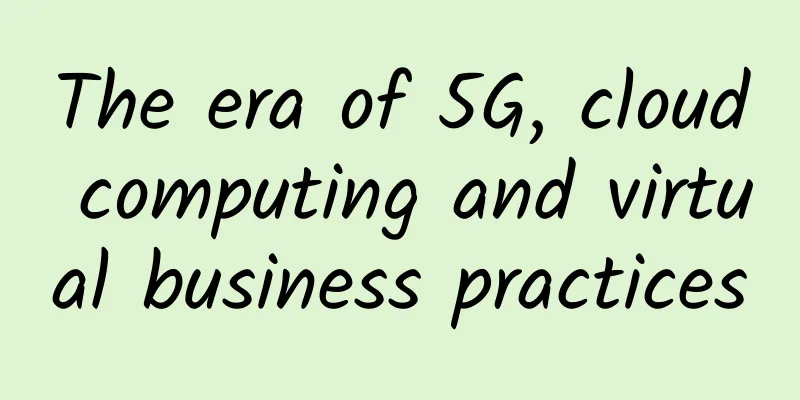The era of 5G, cloud computing and virtual business practices

|
In 2022, virtual enterprises can achieve digital transformation through 5G and cloud computing. The fifth generation of wireless technology will redefine business networks, with widespread use in multiple areas of communications and data processing. 5G is a welcome force, especially for cloud-dependent businesses, thanks to its key advantages of low latency, high speed, and greater capacity. Cloud computing is an integral part of today’s IT infrastructure, and the introduction of 5G will accelerate the digitization of modern businesses. The combination of 5G and cloud computing can bring multiple benefits to enterprises in terms of faster collaboration and improved productivity. 5G can change the cloud computing landscape by adding new architectures and technologies, such as multi-access edge computing (MEC), mobile cloud computing (MCC), cloud radio access network (C-RAN), etc. This article will help you gain a deeper understanding of 5G technology and its impact on cloud computing. What is 5G and why is it important?5G is an improvement over current cellular technology, featuring greater bandwidth and speed. As the world’s shift towards digital platforms and virtual business practices gains momentum, 5G technology will further revolutionize communications. Cloud computing is key to a healthy IT infrastructure in an organization, and 5G technology plays a key role in empowering businesses with real-time data ingestion capabilities. 5G networks allow for enhanced synchronization across different systems. High-speed data storage and transmission capabilities are almost required to conduct business operations, and 5G technology is an effective solution to the latency issues encountered by businesses today. What is 5G cloud computing?Considering the amount of data that businesses process every day, ultra-fast transmission rates are a top priority. 5G cloud computing, in simple terms, is about transmitting data at a higher speed. 5G technology will become a core ally of cloud computing in achieving its data storage and transmission goals with relatively few resources. 5G technology improves the capabilities of cloud computing. How will 5G change cloud computing?1. 5G supports faster data flow and analysisFaster data transmission is one of the major advantages of 5G technology. Cloud computing driven by 5G technology will facilitate faster real-time data streaming. This will greatly boost virtual business practices as 5G cloud computing will facilitate uninterrupted real-time storage and streaming, thereby improving productivity to a great extent. 2. Streamlined operation with high speed and high reliability5G technology is essential for processing large amounts of data from multiple sources in real time. This is of vital importance in supply chain and manufacturing industries where time-sensitive data is integral to driving efficient operations. 5G technology can significantly reduce the cost of big data analytics and streamline industrial operations by managing remote, variable workloads. 3. Enable edge computing through enhanced remote system performanceCloud computing connected to 5G networks opens up the possibility of edge computing. Any backhaul latency associated with a central data center can be solved with edge computing. Edge computing improves remote system performance by reducing bandwidth usage, network congestion, and processing large amounts of data through localized data storage. 4. Enhanced artificial intelligence (AI) and natural language processing (NLP) capabilitiesThe use of 5G technology will enhance the capabilities of artificial intelligence technologies. While cloud computing enables businesses to leverage key technologies such as AI and NLP, the support of powerful 5G-driven networks is important in unlocking the true potential of these technologies. 5G will provide the required data transmission levels for cloud environments to enable these technologies to work effectively. 5. Better security systemsIn addition to facilitating the smooth transfer of data, 5G-driven cloud can also help enhance security and prevent cyberattacks. Enterprises can better identify and prevent cyberattacks, which is crucial in today's era. Moreover, the remote work culture and growing virtual business practices require the implementation of top-level security measures that can be achieved through 5G-driven cloud computing. in conclusionThe introduction of 5G networks will greatly expand the potential and business significance of cloud computing in many ways. While cloud computing plays a key role in accelerating the digital transformation of enterprises, cloud computing driven by 5G technology will enable enterprises to respond faster and better meet real-time needs. Therefore, it is important for enterprises to work with and recruit professional cloud computing service providers who have extensive experience and experience in modernizing or customizing existing cloud infrastructure to meet the needs of 5G networks to ensure that you can fully utilize the new technology. In this era of virtual business practices, 5G-driven cloud computing will undoubtedly become a key factor in determining business success and profits. |
<<: What is the success or failure of SDX?
>>: Review of the year when 5G “set sail”: The wind is right and the sails are full
Recommend
The beginning of the 5G era means the end of American hegemony! (In-depth)
01 There has been a lot of discussion about 5G re...
When you "ping", do you know the logic behind it?
[[262430]] When we encounter a network outage, we...
IoT smart home solutions create intelligent products based on scenarios
"Connected World: Smart Homes Are Key to Fut...
Global IoT application revenue is growing, but the company is in urgent need of finding a platform
Enterprises and public sectors around the world a...
5G and IoT set off a revolutionary wave and provide new value
[[284710]] [51CTO.com Quick Translation] In today...
The Ministry of Industry and Information Technology issued the "Regulations on the Management of Number Portability Services": Nine types of behaviors are strictly prohibited
[[282065]] The Ministry of Industry and Informati...
What is the relationship between NFV and SDN?
NFV and SDN are popular technologies that have em...
The Future of 5G and IoT in Smart Cities
[[438866]] In short, a "smart city" lev...
Riverbed is your smarter choice to accelerate your business with the power of digital experience management
[Original article from 51CTO.com] In the context ...
F5: User-oriented, solving the complexity of multi-cloud environment
The fourth industrial revolution led by digital t...
V5.NET offers 30% off on first order for all new customers, Hong Kong server monthly payment starts from HK$385
V5.NET is a professional independent server renta...
Don't call Riverbed just a WAN optimization company anymore. It's become something more.
[51CTO.com original article] Recently, Riverbed l...
5G is here, what can 5G do?
5G is here. In order to let everyone know clearly...
Goodbye 2G, hello 5G
[[403376]] This article is reprinted from the WeC...









